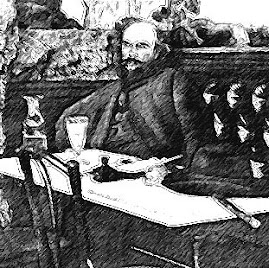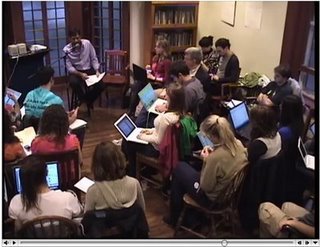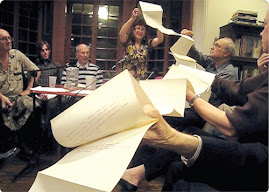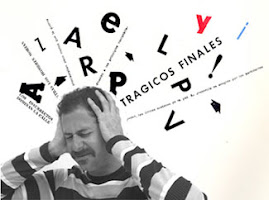 I've read Susan Schultz' Dementia Blog - the ongoing blog project and also a book published under the same title (excerpts from the blog). The blog is the diary of a daughter who cares for her mother as the parent's memory quickly fades, one crisis and change after another, in the usual sad and disorienting progression. But "progression"? Or "regression"? That, in short, is the key question. What is it that we call this human anti-narrativity? How do we describe it? Blogs, written in order, happen to feed to the browser last entry first, and so we read a blog, as it were, from last page to first page. Books conventionally turn this around. The reversal revealed itself to Susan as she wrote. Her primary response (to her mother's changing identity) yields to a secondary response (what is the apt mode for telling others of this) and then the primary/secondary distinction dissolves. To witness is to adjust. The illness becomes the medium.
I've read Susan Schultz' Dementia Blog - the ongoing blog project and also a book published under the same title (excerpts from the blog). The blog is the diary of a daughter who cares for her mother as the parent's memory quickly fades, one crisis and change after another, in the usual sad and disorienting progression. But "progression"? Or "regression"? That, in short, is the key question. What is it that we call this human anti-narrativity? How do we describe it? Blogs, written in order, happen to feed to the browser last entry first, and so we read a blog, as it were, from last page to first page. Books conventionally turn this around. The reversal revealed itself to Susan as she wrote. Her primary response (to her mother's changing identity) yields to a secondary response (what is the apt mode for telling others of this) and then the primary/secondary distinction dissolves. To witness is to adjust. The illness becomes the medium.As you read this work you go backwards into the daughter's recent past to a point just when the mother begins to lose a grasp on her past. Ironically, conventional novelistic progression is repurposed for the digital mode that would normally undermine it. As we move toward the end (the beginning: Susan's return home from a vacation abroad to deal with her mother's first crises), we arrive at wholeness. Not Pip realizing his realistic place in London, nor Emma right-siding the world into appropriate family pairings, nor even Clarissa Dalloway's party which brings the whole fractured cast together, but a happy-ever-after that is a moment in time just before the decline begins. In the end are things as they were.
I recently asked Susan if she would make audio recordings of her reading selections from Dementia Blog and I'm happy to say that she obliged and that PennSound's Susan Schultz author page now features recordings of nine of the diary entries, moving backward in time of course. In addition, we have a 1-minute "about me"--Susan on herself.






 "I teach horizontally, meaning that while I might begin with a fixed idea of what I'm going to teach that day, I let it drift rhizomatically way off topic, often pulling it back when it gets too far. I rely on non-fixed materials to teach this way; the whole world is at my fingertips. Should I go off on a tangent about John and Rauschenberg and their love relationship as expressed in Rauschenberg's bed, an image of that bed is always a click away. From there, we can head anywhere into the non-fixed universe, be it film, text or sound. And of course, that always takes us elsewhere. As Cage says, 'We are getting nowhere fast.'"
"I teach horizontally, meaning that while I might begin with a fixed idea of what I'm going to teach that day, I let it drift rhizomatically way off topic, often pulling it back when it gets too far. I rely on non-fixed materials to teach this way; the whole world is at my fingertips. Should I go off on a tangent about John and Rauschenberg and their love relationship as expressed in Rauschenberg's bed, an image of that bed is always a click away. From there, we can head anywhere into the non-fixed universe, be it film, text or sound. And of course, that always takes us elsewhere. As Cage says, 'We are getting nowhere fast.'" 
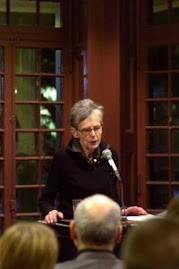
 that anyone has yet got the imaginative measure of that terrifying day six years ago. Certainly our Tolstoy has not crawled out of the rubble. The closest we have, Don DeLillo, succeeded as an essayist-journalist ("In the Ruins of the Future: Reflections on Terror and Loss in the Shadow of September,” Harper’s, December 2001) but, to my mind, failed as a novelist ("Falling Man"). One reason, perhaps, is that the remembered emotion was instantly buried under a pile of cultural junk.' - Tod Gitlin in his review of Susan Faludi's The Terror Dream (written for
that anyone has yet got the imaginative measure of that terrifying day six years ago. Certainly our Tolstoy has not crawled out of the rubble. The closest we have, Don DeLillo, succeeded as an essayist-journalist ("In the Ruins of the Future: Reflections on Terror and Loss in the Shadow of September,” Harper’s, December 2001) but, to my mind, failed as a novelist ("Falling Man"). One reason, perhaps, is that the remembered emotion was instantly buried under a pile of cultural junk.' - Tod Gitlin in his review of Susan Faludi's The Terror Dream (written for 